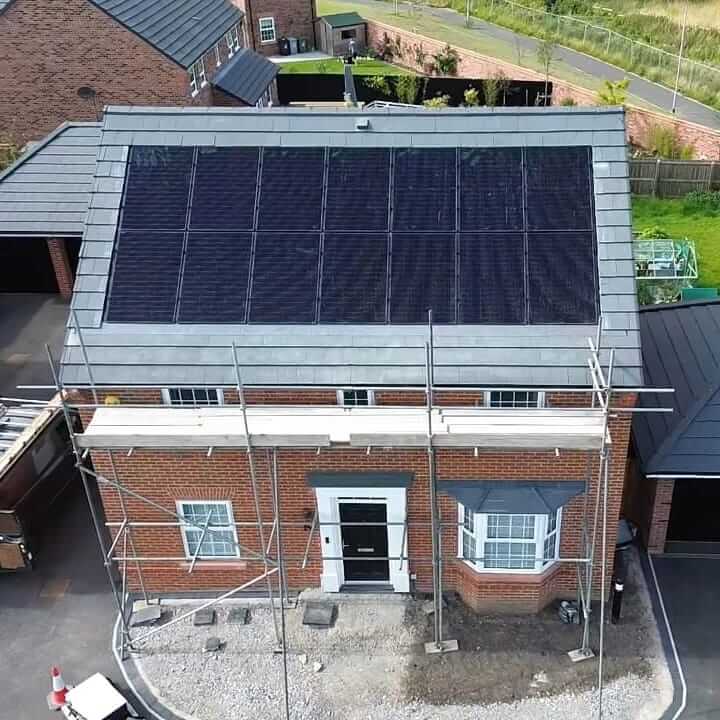As homeowners look for ways to cut energy costs, reduce reliance on the grid, and cut down their carbon footprint, interest in domestic solar panels has risen rapidly. But what exactly does domestic solar power involve, and how do domestic solar panels work?
What is domestic solar power?
Domestic solar power refers to the generation of electricity from solar panels installed on residential properties. The panels capture sunlight and convert it into usable electricity, either to be consumed directly within the home or exported back to the grid.
In most cases, domestic solar panels are designed to offset a household’s electricity needs rather than supply power to other properties or businesses.
So how do domestic solar panels work?
A typical domestic solar system includes:
- Solar panels that capture sunlight and convert it into direct current (DC).
- An inverter that changes DC into alternating current (AC), the type of electricity used in homes.
- A generation meter to track how much energy the system produces.
- Optional battery storage to store excess electricity for use later.
When sunlight hits the panels, electricity flows into the home’s wiring, powering appliances. If the system produces more than you use, the surplus is either stored in a battery or exported to the grid.
How much power can domestic solar panels generate?
The amount of electricity generated will depend on a range of several factors including:
- System size: usually between 3 kW and 6 kW for UK homes.
- Roof orientation and angle: south-facing roofs perform best, but east and west orientations can still be effective.
- Shading: nearby trees, chimneys, or buildings can reduce efficiency.
- Seasonal variation: output is higher in summer months and lower in winter.
On average, a well-designed domestic solar system can supply around 40–60% of a household’s annual electricity demand.
What are the advantages of domestic solar panels?
There are a number of benefits and advantages to installing domestic solar panels. These include:
- Reduced electricity bills: generating your own power means buying less from the grid.
- Energy independence: less reliance on fluctuating energy prices.
- Lower carbon emissions: a clean, renewable energy source that reduces reliance on fossil fuels.
- Potential earnings: payments for exporting unused electricity under schemes like the Smart Export Guarantee (SEG).
- Increased property value: energy-efficient homes can be more attractive to buyers.
How much do domestic solar panels cost?
The cost of installing solar panels varies depending on system size, equipment choice, and property type. In the UK, typical domestic solar installations cost between £5,000 and £8,000 for a standard 3-4 kW system.
Adding a battery storage system can increase upfront costs by several thousand pounds, but it also increases self-consumption of solar electricity, improving long-term savings.
Is my home suitable for domestic solar power?
Most homes can install solar panels, but suitability depends on a range of factors, including:
- Roof direction: south-facing roofs are ideal.
- Roof size: enough space is needed for the number of panels required.
- Roof condition: panels should be installed on structurally sound roofs.
- Shading: minimal shading ensures maximum efficiency.
An installer will carry out a site survey to determine your home’s potential.
How long do domestic solar panels last?
Solar panels are durable and designed to last 25-30 years or more. Performance may degrade slightly over time, but most manufacturers offer warranties guaranteeing around 80% of original output after 25 years.
Inverters typically need replacing after 10-15 years, while batteries may last 10-12 years depending on usage.
Can domestic solar power work without batteries?
Yes, you don’t need a battery for solar panels to work. Without storage, excess electricity is exported to the grid. However, adding a battery allows you to use more of your own energy, particularly in the evenings or on cloudy days.
Batteries aren’t essential but can significantly improve the return on investment for many households.
How much maintenance do domestic solar panels need?
Domestic solar panels require very little maintenance. They have no moving parts and are designed to withstand weather conditions. Key points include:
- Cleaning: rainfall usually keeps panels clean, but occasional cleaning may be needed in dusty or polluted areas.
- Monitoring: systems can be monitored via apps to ensure performance remains consistent.
- Servicing: periodic checks by an installer can help identify any issues early.
Is domestic solar power worth it?
For many households, domestic solar power is a sound investment. Savings on energy bills, combined with payments for exported electricity, mean most systems pay for themselves within 7-10 years. With panels lasting 25 years or more, the long-term financial and environmental benefits are considerable.
The exact value depends on your home’s energy use, roof suitability, and whether you add battery storage.
Choose Eco Renewables for your domestic solar panels
Domestic solar power is an increasingly practical solution for households seeking cleaner, cheaper, and more reliable energy. For more information or advice, why not contact the experts today, here at the Eco Renewables Group? We work across the North West, from Southport to Kendal, to deliver high quality solar power solutions.







